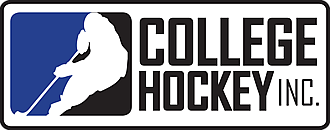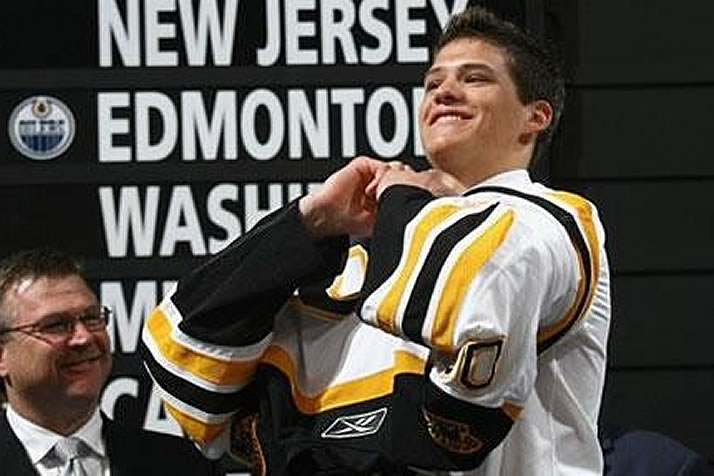


By A.J. Atchue
There was a time not too long ago when forward Joe Colborne stood as the Boston Bruins' unquestioned top prospect, and with very good reason.
Drafted with the 16th pick of the 2008 Entry Draft following an impressive two-year stint with the Camrose Kodiaks of the Alberta Junior Hockey League, Colborne continued to improve his game during two seasons at the University of Denver, including a 2009-10 campaign in which he led the Pioneers with 22 goals in 39 games.
Colborne concluded last season by playing six games with the AHL's Providence Bruins, his first taste of pro hockey.
Then, the second pick of the 2010 Draft fell into Boston's lap, and all of a sudden 18-year-old forward Tyler Seguin became the Bruins' new can't-miss prospect.
And while it may be occurring a bit more under the radar than otherwise would have been the case, Colborne is rounding into form nicely in Providence this season as he works toward earning his own spot on the big club sooner rather than later.
"It's never been an issue," Colborne said of the spotlight focused on Seguin. "It was a positive for me, I think, just knowing that my goal is to win some Stanley Cups, and the way you do that is to start surrounding the team with good young players."
A 20-year-old native of Calgary, Colborne said he's been dreaming of reaching the NHL since the tender age of 3 or 4, and it's hard not to believe him.
From the humble beginnings of shooting countless pucks with his father in the basement of their home, Colborne played for Camrose in 2006, and a 33-goal, 90-point season in 2007-08 led to his first-round selection by the Bruins.
"That's the year when I was given an opportunity to be a go-to guy on the team, and I tried to take it to heart and take advantage of the opportunity," he said. "I can't say enough about the hard work I put in and the number of people I had helping me out to really blossom that year."
Colborne has participated in three summer prospect camps in Boston. He went from being an admittedly nervous 18-year-old unsure of what to expect in 2008 to serving as one of the leaders in the camp this past summer, which gave him a leg up heading into his first NHL training camp.
But with a Bruins squad already deep at the forward position, Colborne knew it would be an uphill battle to stick in the NHL this season. Missing several days after taking a stick to the face in his first rookie game didn't help matters, and Colborne ended up as one of the last players assigned to Providence.
"It was tough, no doubt, but the way I looked at it was here in Providence, we have a great situation with some good, knowledgeable coaches who I've already learned a bunch from," he said. "We have a good team system. Since I've been down here, I've been working as hard as I can to learn as much as I can and keep improving."
Colborne noted that over the past several years -- and especially this past summer in preparation for his first professional season -- he's needed to build up his strength to the point where he can use his 6-foot-5 frame to his advantage.
Providence coach Rob Murray, who has worked with Colborne at all three prospects camps, is pleased with Colborne's progress thus far.
"I saw a huge difference in his body composition even between the end of last year and this year's training camp," said Murray, a former physical forward himself who ranks sixth in AHL history with 1,018 games played over a 15-year career. "He really dedicated himself to get bigger, to get faster. He was that big guy who was still a little soft when he was first drafted, and he made a commitment this past summer to make sure that he's put himself in the best position to have success."
Colborne was 190 pounds when he was drafted, but he's listed on the AHL Website at 213. Now he's learning how to utilize his size and strength to make life difficult on opposing defenders in the offensive zone.
"When he's able to establish position down low with the puck in the offensive zone, it's very hard for anybody to take him off it," Murray said. "He's a big, strong kid, and protects the puck real well, especially if he gets his feet moving."
"I've really been focusing on my puck protection and puck control the past couple years," Colborne said. "I like to have the puck on my stick as much as possible and make plays, whether it's for my linemates or opening shots for myself."
Those plays weren't materializing early in the season, though, as he had no goals and 4 assists in his first eight games.
After nabbing his first professional goal Oct. 31 against Worcester, though, Colborne broke out with consecutive two-goal games Nov. 6 and 7, and he's now tied for second on the P-Bruins with 11 points through 15 games.
"We went through a lot of video clips the first few weeks I was here," Colborne said, "little things that can really make a difference in a game, whether it's tightening up my defensive- and neutral-zone play, changing different tendencies I had that can help generate an extra chance or two. I definitely listened to what they were telling me and incorporated it into my game."
For his part, Murray has been impressed with Colborne's mindset right from the beginning.
Despite his status as a top prospect, he didn't bring a sour attitude with him to Providence after being assigned to the AHL, and he's always open to feedback.
"There was a reason why he wasn't having success, and I wanted to show him why," Murray said. "There were a lot of details he needed to clean up, he was receptive to it, and as he started to do that, so came his success.
"He wasn't getting the puck enough earlier in the season because he tended to be out of position. Once he started cleaning that up, all of a sudden he found himself with the puck a lot more, and he's having a lot more success."
A natural center who played primarily on the wing last season at Denver, Colborne is back in the middle to start his pro career.
With the logjam of established NHL centers in Boston, though -- Marc Savard, David Krejci, Patrice Bergeron, as well as Seguin, a natural center who also has played on the wing -- Colborne ultimately may need to shift to the wing full-time if he's going to make the jump to the NHL.
No problem, says Colborne.
"I felt like I was really able to learn the position quickly, and by the end of the year I felt like it was a pretty natural position for me," he said of playing on the wing. "If that's the way I can make it to the big club, I'd be more than happy to play wing, and I feel like I'd be able to make the transition pretty quickly."
A case can be made that in several other organizations with more forward slots available, Colborne already would be in the NHL, but he wouldn't have it any other way right now.
"From Day 1 when I got drafted, it's been pretty special here," Colborne said. "The history behind all the greats that have played in Boston, it definitely brings you some excitement and makes me want to improve and get to play up there even more."